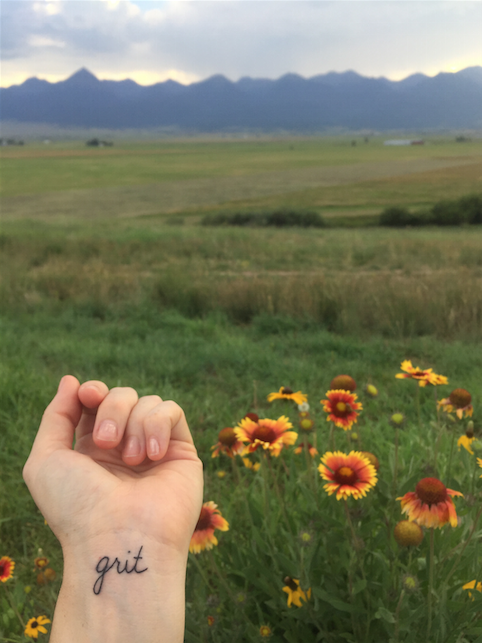No grit, no pearl

Several years ago, I took to writing the word “grit” on my wrist. Any time I was faced with a challenge, emotional or physical, I would take a Sharpie and give myself a visible reminder to hang tough.
Because that’s what grit is: courage in the face of anything. Strength of character. Steely-eyed endurance. Firmness of mind. An indomitable spirit. Pluck. I like these descriptions; they’re traits I’d like to embody, words of fortitude, resilience, and backbone. “Grit” was on my wrist when I climbed a host of Colorado mountains by myself, when I went into difficult meetings at work, and when I ran my first marathon earlier this year. Associating myself with the concept of grit, no matter how contrived, makes me feel strong and capable and — if I’m honest — like a badass. I like this version of grit.
But there’s a more literal, concrete definition: grit can simply refer to rough, loose particles of stone or sand. The other day, I was walking Foxy on a dirt trail in flip-flops, and felt the sharpness of dust and gravel slide in against my feet. Grit can be abrasive. Grit can be painful.
Anyone who has gone through major loss knows that there are moments in which survival feels impossible. Sharp sadness invades uninvited and rubs so raw it feels as if your heart cannot go on beating, that the open wound of gritty grief might actually kill you. This has been true for me in the aftermath of my recent unraveling. On the worst days, my heart has felt so exposed, so sore, that I have been tempted to react desperately and defensively. I’m ready to build a shield to protect myself from ever hurting this way again.
But then I remember, that is not how the pearl gets made.
Like our hearts, oysters are soft and tender, relying on their hard shells to keep them safe. But occasionally, a grain of sand will sneak in, and this coarse foreign object — this grit — can cause pain, rock against flesh. One might think that the oyster would react protectively, forming a leathery callous to protect itself, but it doesn’t. The oyster remains soft, yielding to the suffering, and slowly, over time, begins to wrap the grain of sand in translucent layers of beauty.
The pearl is the oyster’s response to the pain.
I wish it didn’t hurt so badly. I wish the pain could be erased. But as my friend Becky recently said to me, “God isn’t an eraser, he’s a redeemer.” There is no changing what has happened, no denial of what’s been done — but there is hope for redemption, for something beautiful and new. God brings beauty from ashes and pearls from dirt.
So I will keep my heart soft, giving myself over to the pain in the trust that it will be transformed. I will keep my back strong, summoning the courage and resolve to keep going. And I will keep my wrist inked — now permanently — with grit.

share:
tags: Annie Parsons | Grief | Grit | grit | Pain | Transformation
You and your writing are lovely.
Yes yes YES. Emphatically. Amazingly. I love the words and the concept and the truths and the ink. Once again, reading this makes me feel so proud of you.
i love that you said “my first marathon.” i have two tattoos and i love then. they are such good reminders for me in everything. people ask me if i regret them. no. i hope yours gives you life and good reminders of what is true about us.
Such tender and strong words, such purpose and passion.
I love this: so wise and true and also so hard. And yes to the grit. Yes to that courage in the face of anything. Thank you for sharing your story, friend.
Wish I had the words…but after reading your masterpieces, I am always left without adequate ones. So proud of you, Annie. So proud of your grit.
You are bad ass, Annie.